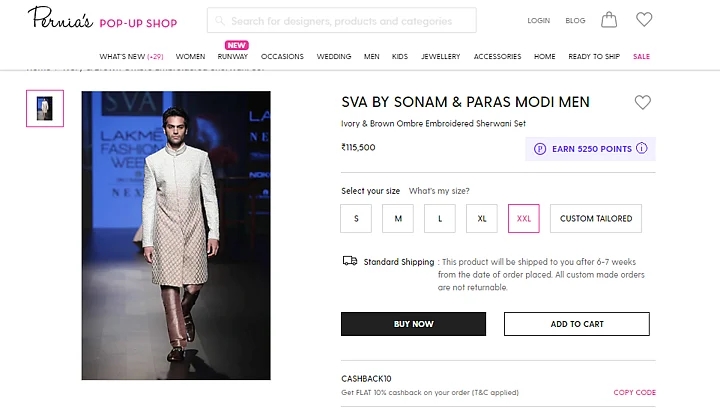A quick Google search for "fat tax" will lead you to articles from 2016 talking about a certain 'fat tax' imposed on junk food in Kerala. Intention? To curb obesity. However, what Google will tell you absolutely nothing about are the discriminatory fatphobic practices of the Indian fashion industry.
Recently, Instagram account Diet Sabya started a conversation around 'fat tax' in the fashion industry, and the responses were...shocking.
What Is This So-Called 'Fat Tax'?
Historically, the fashion industry has been discriminatory against anyone who's doesn't fall within whatever's considered the 'normal' range of body sizes. This normal isn't actually based on facts. It's more...aspirational. However, in the recent past this has been changing. We now have plus-size models ruling social media, making appearances at fashion weeks, being featured in magazines. Slowly and steadily, even fashion brands are now actively trying to be more size-inclusive.
But turns out, there's a catch. A big one that not a lot of people seem to be talking about.
In the name of being ‘inclusive’ by catering to their plus-size clientele, many luxury fashion brands are pricing their products at a significantly higher rate.
Overpricing? By How Much?
Now that depends..
According to Diet Sabya's Instagram stories that crowd-sourced personal experiences related to this 'fat tax,' brands can charge anywhere up to Rs 7,000.
However, we did a little bit of our own digging and turns out the price difference can be way more than that, depending on the outfit, the brand, and of course, gender.
For example, we found a Royal Rust Embroidered Lehenga Set by Seema Gujral that cost Rs 1,76,000 in sizes XS-XL but Rs 1,93,600 for all sizes above that. The difference is a whopping Rs 17,600!


In the men's section, we found the difference to be slightly lesser.. although not by much. The difference between a men's outfit in sizes S-XL and any size XXL onwards could go up to Rs 10,500.


Of course, there's no standard rate of 'fat tax' and the additional cost seems to vary from one luxury brand to another. Even within a luxury brand, there's no uniformity.
Depending on how elaborate a piece of clothing is, the additional cost might change.
The Reason?
Designers claim that making plus size clothes costs more because of additional fabric and embroidery requirement. A technicality that an average person can't argue about. However, according to an anonymous responder in Diet Sabya's DMs, embroiders' charge based on the amount of time spent in making a product and the cost actually has nothing to do with the embroidered area.

Something Smells Fishy..
But here's why I think this 'fat tax' system is just another way to mint money...
An arbitrary inspection of clothes of Masaba Gupta's House of Masaba website revealed uniform prices of clothes across all body sizes. Great job, Masaba! But does she know that her clothes on other websites are being sold at a higher price?
This Marigold And Blooming Pillar Lehenga Set by Masaba on the House of Masaba website costs Rs 28,000 in sizes XS-XXL. However, Carma, a Delhi boutique, is selling the same in XL for Rs 30,800 and in 6XL for Rs 33,600. Does Masaba know this? We doubt.


Why Is This Wrong?
For starters, it completely beats the point of inclusive clothing. The whole point of having an inclusive size range is so that people of ALL sizes feel welcome and comfortable. Now, if you charge more for certain bigger sizes, you're essentially still discriminating. In fact, it almost feels like you're punishing fat people for being the size that they are. You're still shaming people for being fat, only now you're justifying it with arbitrary reasons that no one can verify.
Moreover, if we were to assume that the pricing is based on objective parameters like cost of fabric, embroidery et al. then wouldn't that change for smaller sizes also?
In that case, shouldn’t skinny people who wear XS get clothes at discounted rates as compared to people who wear large clothes?
Does This Happen Only In India?
Nope! In 2018, one of Britain's most popular clothing giant New Look came under fire for selling 'plus-size' clothes at a higher price. This sparked a heated debate on social media, with women questioning the logic behind the practice. Some hit back with sensible analogies; they wondered if shoes in bigger sizes should also automatically cost more.
Prior to that, in 2014, clothing company Old Navy received flak for charging a 'fat tax' on plus-size clothing for women, but not men.
Speaking of Plus-Size..
When we use the term 'plus-size', we contrast it with an alternative size range that is considered to be the average size range. However, this alternative size range, in every country, is often based on unrealistic standards set by the media and the beauty/fashion industry. In which case, the idea of 'plus-size' itself can be considered problematic. Many feminists, including yours truly, believe that the idea of 'plus-size' itself is quite discriminatory and with an invisible 'fat tax' in place, clothing brands are only making the divide worse.
The Silver Lining
Diet Sabya's little Instagram initiative convinced Gauri & Nainika, a Delhi-based luxury fashion label, that charging extra for larger sizes was "unfair and unethical" and they've stopped the practice.

Fuel The Store, a Mumbai-based independent store, also reached out to Diet Sabya to announce that they have done away with the toxic practice.

This might not be a lot but it's definitely a small victory in the larger battle that's only just begun!
(At The Quint, we are answerable only to our audience. Play an active role in shaping our journalism by becoming a member. Because the truth is worth it.)

